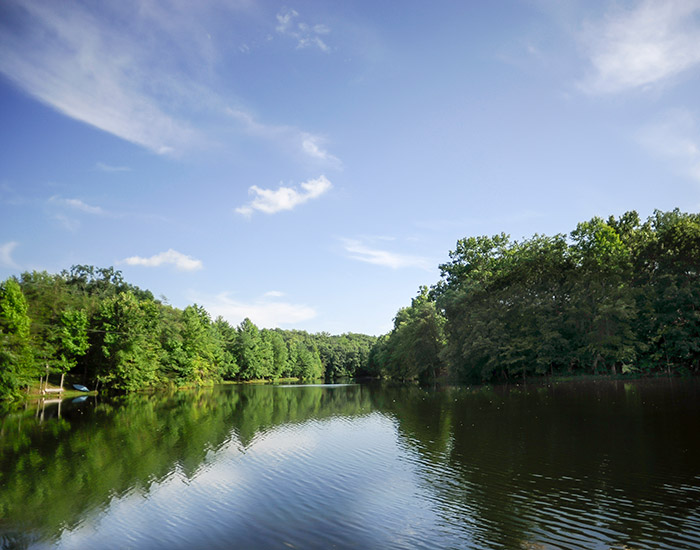
Uplands Village has a long tradition of health and environmental activism, starting with founder Dr. May Cravath Wharton. Many Uplanders are change agents in the larger Cumberland County community, and some of this volunteer work is guided by the Uplands Board of Directors’ Environmental Quality Committee, nicknamed the Green Team.
Founded in 2015, the Green Team focuses on tangible steps that Uplands can take to support the health of residents, staff members and the environment. Committee members research and present information about best practices to improve the health of the environment and anyone who steps foot on the 500-acre campus.
The committee is cochaired by Dr. Marie Fortune and Dennis Gregg.
Projects that came to fruition in 2017 included the implementation of a robust recycling program to reduce the cost of waste management at Uplands Village; a new policy to prohibit use of pesticides and herbicides by Uplands staff members and vendors; and a buffer policy to protect the wetlands, lakes, pond and streams on the campus. The committee began working to live in harmony with the beaver population that has returned to the region and is working on an initiative to improve storm water management through environmentally friendly or green practices.
Recycling at Uplands Village
The recycling program in rural Pleasant Hill, Tennessee, is a model program for the state. Even though the community is small, with a population of just 500, Uplands provides curbside recycling pickup.
That is unheard of in the state of Tennessee, committee member Dr. Anne Ganley said, particularly given the rural nature of the area.
“That is all because of the longtime environmental activism and volunteerism here,” she said. “Uplanders work, volunteer and give on behalf of a healthy environment.”
The 2017 recycling initiative involved setting up recycling sites campuswide so staff members would have places to recycle as well. It is a cost-saving initiative that also helps the environment and improves the health of residents and staff.
“We’ve had a very high rate of recycling by residents because that’s been a longtime concern for them,” Anne said. “Now, we are working to change practices at Uplands’ organization-owned buildings.”
The recycling project was a multistep initiative launched last year. Planning began in late 2016. The next phase will be to evaluate how the program is working and to adjust as needed.
Protecting Our Waters and Ourselves
The board, armed with research provided by the Green Team, passed a policy in 2017 to prohibit the use of pesticides and herbicides by Uplands’ staff and vendors. They invite residents who own property to attend educational events that encourage the elimination of toxic chemicals because of the health hazards to residents and staff and the potential impact on the waters.
“It’s not about controlling individual residents on their property, although we invite them to participate,” Anne said, adding the committee hopes Uplands Village will lead by example.
Buffer Policy
Related to that initiative was a new board policy to create a buffer around the waters on the Uplands campus, including the pristine Lake Laura and Lake Alice. When the board saw that Lake Laura was beginning to degrade rapidly, due in part to a 2016 drought, it passed a policy to create a natural buffer zone that acts as a filter for the lakes and improves the health of the water. Mowing and applying chemicals around the lakes are prohibited.
Through the water quality effort, the Green Team found that beavers, which had returned to the area in recent years, provide a lot of free maintenance for the lakes. The challenge has been to address flooding and chewing of desirable trees, but the plan to coexist in a productive way with the beavers is underway.
“That’s just part of keeping the environment healthy, which also keeps us, as residents and employees, healthy as well,” Anne said.
In 2018, Uplands began addressing stormwater runoff, a major challenge on campus. The Green Team began with an assessment and shared best practices that increase the ability of the land to absorb the water, rather than damaging Uplands Village or resident properties.
The committee will also continue to look for alternative energy options like solar panels for future construction to increase energy efficiency.
“We are continuing our focus in 2019, through environmental sustainability and stewardship, not only to provide a healthier community but also to save money,” Anne said. “In this day and age, this is true for all communities as we try to be cost effective and manage our resources well.”
To this end, residents and staff members alike are invited to “come build with us a green community on top of the Cumberland Plateau,” Anne said.
